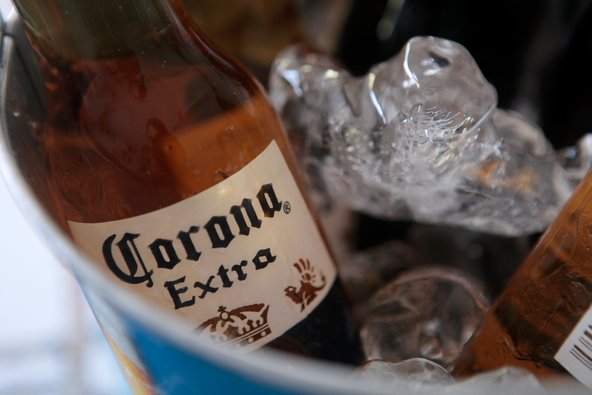 Victor Ruiz Garcia/ReutersConstellation will get rights to make and sell Corona.
Victor Ruiz Garcia/ReutersConstellation will get rights to make and sell Corona.
7:26 p.m. | Updated
WASHINGTON — Anheuser-Busch InBev, the country’s largest brewer, agreed on Friday to sell the United States rights to several foreign brands, including the top-selling Corona, in a deal that regulators say will ensure competition in beer prices.
The settlement of the Justice Department’s antitrust lawsuit means that Anheuser-Busch InBev, which controls 39 percent of the American beer market, can go ahead with its $20.1 billion takeover of Grupo Modelo of Mexico, the brewer of Corona.
But as part of the agreement, Anheuser will sell Modelo’s 50 percent stake in Crown Imports, which distributes Corona and other Modelo brands in the United States, to Constellation Brands, which already owned the other half.
Related Links
 Document: Ruling on Beer Deal’s Antitrust Suit
Document: Ruling on Beer Deal’s Antitrust Suit - Anheuser-Busch Merger Deal Clears an Antitrust Hurdle (April 5, 2013)
For American consumers, the agreement will help keep beer prices down, government officials say, although there will be little practical effect on what beer buyers will see when they go shopping.
“This is an $80 billion market,” said William J. Baer, an assistant attorney general who oversees the Justice Department’s antitrust division. “Even a 1 percent price change would cost consumers $1 billion a year. This agreement will help to keep the market competitive, dynamic and quite healthy.”
The Justice Department’s antitrust division filed a lawsuit in January to block the merger. The government’s opposition was a big blow to Anheuser-Busch InBev, which saw the acquisition as vital to its push to expand in Mexico and the rest of Latin America. In February, the two sides announced they were in talks to resolve the antitrust concerns.
The settlement will leave Constellation — one of the country’s largest wine producers — with full and permanent rights to make and sell Corona, Corona Light, Modelo Especial, Pacifico and six other brands in the United States.
“Ultimately, nothing will change for consumers in the U.S. as a result of this transaction,” said Laura Vallis, a spokeswoman for Anheuser-Busch InBev. “The proposed combination with Grupo Modelo has always been about Mexico, and making Corona more global in markets other than the United States. Beers that Mexican consumers enjoy and appreciate will now get a larger worldwide presence.”
Constellation will pay $5.5 billion for Modelo’s share of Crown and for the Piedras Negras brewery, a new production and bottling plant in Mexico near the border with Texas.
Rob Sands, president and chief executive of Constellation, called the deal “the most transformational event in the history of our 68-year-old company,” one that would double sales and significantly increase profits and free cash flow.
Anheuser-Busch InBev is itself the result of a $52 billion merger in 2008 between the maker of Budweiser and a Belgian-Brazilian brewer. It was looking to expand internationally, and wanted to secure the rights to sell Corona and Modelo’s other Mexican brands around the world, particularly in Europe and South America.
Corona is the top-selling imported beer in the United States and the fifth-largest seller over all. Few imports to Europe, analysts say, have a greater potential for growth there.
But the Justice Department decided that in the United States, joining the marketing of Corona with that of Bud Light, the country’s biggest seller, and other top brands would result in too much consolidation and too little price competition.
A merger of the 39 percent market share of Anheuser-Busch InBev, also known as ABI, with Modelo’s brands, which account for 7 percent of the United States market, would put 46 percent of the market in one company’s hands.
That would essentially make the United States beer market a duopoly, because MillerCoors, the second-largest brewer of beer sold in the United States, controls 26 percent of the market. The next largest company would be Heineken USA at 6 percent.
But even those large market shares understate the effect of the market power of the two largest companies, which tend to “engage in significant levels of tacit coordination” in pricing, the Justice Department said. Anheuser would usually raise prices in the fall, and shortly thereafter MillerCoors would follow suit, often with the same increase, the regulators said.
In certain geographic market areas, however, Modelo accounts for as much as 20 percent of sales, and that gives it a unique ability to enforce price competition on the larger companies in those markets.
From 2010 to 2012, the Justice Department said in its lawsuit, aggressive pricing by Modelo in California, Texas and New York City kept Anheuser from raising prices, forced it to lower prices or caused it to lose market share.
The new arrangement will keep the Modelo brands competing with Anheuser-Busch InBev’s products in the United States. Constellation has never brewed beer, however, making the deal a new direction for the company. Currently, it produces and markets wine and spirits, including Robert Mondavi and Clos du Bois wines and Svedka vodka.
Constellation will gain control of a new, state-of-the-art brewery that is about at the midpoint of the 1,240-mile border between Texas and Mexico. The company plans to nearly double the plant’s capacity to take over the brewing of Modelo products for the United States.
Article source: http://dealbook.nytimes.com/2013/04/19/anheuser-busch-reaches-deal-with-antitrust-regulators/?partner=rss&emc=rss
Speak Your Mind
You must be logged in to post a comment.